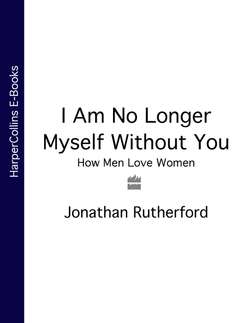I Am No Longer Myself Without You: How Men Love Women

Реклама. ООО «ЛитРес», ИНН: 7719571260.
Оглавление
Jonathan Rutherford. I Am No Longer Myself Without You: How Men Love Women
I AM NO LONGER MYSELF WITHOUT YOU: How Men Love Women
Copyright
CONTENTS
1 SILENCE
2 MOTHER
3 FATHER
4 NEW MEN
5 ROMANCE
6 SEDUCTION
7 LOVE
Acknowledgements
About the Author
About the Publisher
Отрывок из книги
JONATHAN RUTHERFORD
AN ANATOMY OF LOVE
.....
When I was a boy, adventure stories mapped the geography of my desire: the sands tramped by the foreign legion, the seas sailed by plucky young English midshipmen, the veld of southern Africa, the islands, shipwrecks and pirates of England’s maritime history. I escaped and travelled to every distant corner of the globe without leaving the confines of my bedroom. I had no fear of being lost or abandoned. I lived periodically in deserts, and as a castaway on tropical islands, my desire transmogrified into heroic feats of survival. I had created a dream world entirely my own, full of angels and demons and mythical beings. In later years I was captivated by the frontier spirit of the Beat generation – Jack Kerouac, Allen Ginsberg and Neil Cassidy, who headed across America demonstrating their rejection of the Cold War and 1950s white suburbia. The road was their metaphor for masculine freedom and self-expression, exemplified by Robert Frank’s photograph US 285, New Mexico, an infinite road heading off into a limitless future. Kerouac, with his compulsion to travel without stopping, was the personification of mobility: ‘somewhere along the line I knew there’d be girls, visions, everything; somewhere along the line the pearl would be handed me.’ It never was. Kerouac ended his life in his mother’s house, where he died a drunk, defeated by the impossibility of his longing.
Kerouac wanted the simple things in life – marriage, possibly children. He was old fashioned at heart. He craved love but never knew how to ask for it. He believed he’d find it over the next hill, in the next town, on the next journey. In my own youth I could see none of this hopelessness because I was seduced by his poetry and the romanticism of his adventurous life. I dreamed of pursuing my life in the way that Kerouac had his. It never occurred to me that if I did so, I might end up running away from it. Kerouac pursued life because he felt he did not have it. The stories men write and tell each other – in literature, poetry, films, television programmes – provide us with the words and images of masculinity, giving us the means to define ourselves. Like the adventure stories of my boyhood, Kerouac’s narrative offered me an opportunity to escape from the confinement of my upbringing. If I now return to the imaginary islands and deserts and roads of my boyhood and youth, it is to excavate these stories and undo them from the inside. I want to unpick the seam of their narratives and discover Kerouac’s pearl – the silence I think I may find at their heart.
.....